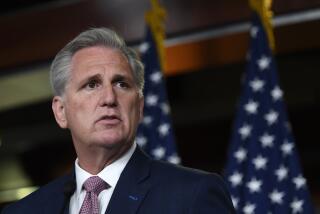Senate GOP Hones Campaign Reform Ax
- Share via
WASHINGTON — The Senate Republican majority began its election-year drive to kill campaign finance reform Monday, confident that the public will neither notice nor care whether Congress leaves election laws unchanged, despite two years of revelations of fund-raising improprieties by both parties.
Senate Majority Leader Trent Lott (R-Miss.) offered as the GOP’s sole prescription a measure to restrict the use of union dues for political purposes.
But labor-friendly Democrats, who seek broad and stricter campaign contribution limits, denounced Lott’s measure as “a poison pill” designed to derail the reform effort.
The confrontation foreshadows a partisan stalemate that likely will doom campaign finance reform for the year.
That chasm was further exposed as Lott suggested that instead of “more controls, more restrictions” on campaign donations, he said, “we should go the other way.”
The split in the Senate, largely along party lines, leaves few doubts about the debate’s outcome. Lott flatly predicted “a replay of the events of last fall,” when the Senate became hopelessly gridlocked over the issue and then moved on to other business.
Reopening the floor debate Monday, Lott called his bill “an American thing” and insisted that it must be “the gate through which campaign finance reform must proceed--if it is to proceed at all.”
The Mississippi Republican also signaled his determination not to let the issue fester in the chamber, noting pointedly that the Senate has pending before it “some really very important issues.”
Sen. Russell D. Feingold (D-Wis.), a key reform advocate, belittled Lott’s proposal as a smoke screen, saying that it does not begin to address the massive fund-raising transgressions by both parties in 1996 that he said amounted to a “virtual destruction” of election law reforms enacted after the Watergate scandal of the Nixon administration.
The broad reform plan crafted by Feingold and Sen. John McCain (R-Ariz.) is tantalizingly close to winning the backing of a majority. It now has as co-sponsors all 45 Senate Democrats and three other Republicans: Fred Thompson of Tennessee, Susan Collins of Maine and Arlen Specter of Pennsylvania.
But it takes 60 votes to break a filibuster and neither side has that many; hence the deadlock.
The McCain-Feingold bill would ban “soft money”--unlimited donations to political parties intended for “party building” activities--that often is channeled to individual campaigns. Such funds were at the center of congressional investigations into irregularities during the 1996 presidential campaigns.
The bill also would establish a “bright line” test 60 days before an election to differentiate between political “attack” ads and true issue ads, with the former subjected to federal restrictions and reporting requirements. Technically, issue ads are restricted from promoting the election or defeat of a specific candidate.
In addition, the bill would encourage candidates to voluntarily limit the use of their personal wealth on their own campaigns.
Sen. Mitch McConnell (R-Ky.) has led the attack on the McCain-Feingold bill, saying it is unconstitutional because it would restrict free speech--in the form of money.
To counter the McCain-Feingold bill, Lott and the GOP majority in the Senate are promoting the “Paycheck Protection Act,” which would bar unions from using members’ dues for campaign donations without their written authorization.
That goes well beyond a similar provision in the McCain-Feingold bill, which would simply require unions to notify their nonunion members that they are entitled to a refund of the portion of their “agency” fees used for political purposes.
Lott argued that an individual’s right to be free from compulsory political payments should begin before the payment is made, not after.
Democrats have accused the GOP of seeking revenge against organized labor because unions spent about $35 million on TV ads in 1996 to promote Democrats and attack Republicans. But Lott said the GOP’s position is based on principle.
“No one should be forced to make a political contribution,” Lott said in a floor speech. “No one should be compelled by a union or a corporation or a Congress to give their hard-earned dollars to a candidate or a campaign.”
Procedurally and by unanimous consent, McCain and Feingold were allowed Monday to introduce their bill as a substitute to Lott’s proposal. A vote to table the McCain-Feingold bill is scheduled for today, but it is unlikely to get the required 60 votes. Similarly, a vote to kill Lott’s bill also is not expected to prevail.
More to Read
Get the L.A. Times Politics newsletter
Deeply reported insights into legislation, politics and policy from Sacramento, Washington and beyond. In your inbox twice per week.
You may occasionally receive promotional content from the Los Angeles Times.








